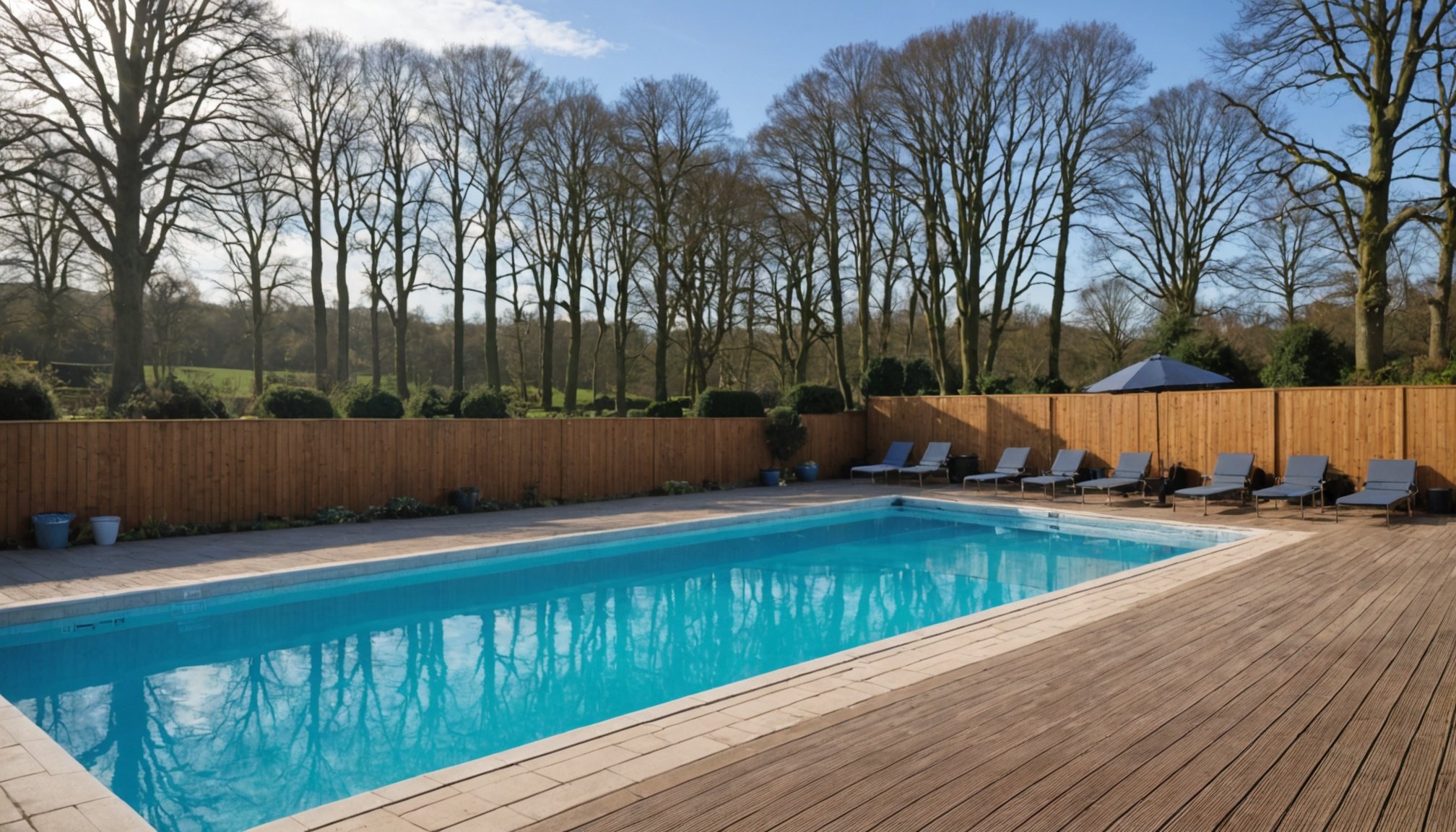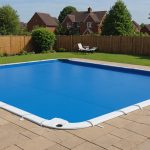Top Strategies to Prevent Winter Freeze Damage in UK Swimming Pools
As the winter months approach, swimming pool owners in the UK face a significant challenge: protecting their pools from the damaging effects of freezing temperatures. Winter freeze damage can be costly and time-consuming to repair, but with the right strategies, you can ensure your pool remains safe and ready for the next swimming season.
Understanding the Risks of Winter Freeze Damage
Before we dive into the strategies, it’s essential to understand why winter freeze damage is such a significant concern. When water freezes, it expands, which can cause severe damage to your pool’s structure, equipment, and surrounding areas.
A voir aussi : Top Safety Pool Covers for UK Homes: Your Ultimate Guide to Accident Prevention
- Pool Structure: The expansion of frozen water can crack or break pool tiles, walls, and floors.
- Pool Equipment: Pumps, filters, and other equipment can be damaged if water inside them freezes.
- Surrounding Areas: Freezing water can also damage the pool deck, surrounding landscaping, and even the foundation of your home if the damage is severe.
Preparing Your Pool for Winter
Preparing your pool for the winter months is a multi-step process that involves several key actions.
Draining and Cleaning the Pool
One of the first steps in winterizing your pool is to drain it to the recommended level. Here’s how you can do it:
A lire aussi : Top Poolside Plants Perfect for Thriving in the UK Climate
- Drain the Pool: Use your pool’s drainage system to lower the water level to about 12-18 inches below the skimmer opening. This helps prevent water from entering the skimmer and freezing.
- Clean the Pool: Perform a thorough cleaning of the pool to remove any debris, dirt, or algae growth. This includes scrubbing the pool walls and floor, and vacuuming the pool floor.
- Balance the Water Chemistry: Ensure the water chemistry is balanced before closing the pool. This includes adjusting the pH, alkalinity, and calcium hardness levels.
### Water Chemistry Checklist
- pH: Between 7.2 and 7.8
- Alkalinity: Between 80 and 120 ppm
- Calcium Hardness: Between 200 and 400 ppm
- Chlorine: Between 1 and 3 ppm
Protecting Pool Equipment
Your pool equipment is just as vulnerable to winter damage as the pool itself.
- Drain the Pump and Filter: Drain the pump, filter, and any other equipment to prevent water from freezing inside.
- Use Winterizing Kits: Invest in winterizing kits that include plugs and seals to protect the equipment from freezing.
- Store Equipment: Store any removable equipment, such as the pool ladder and handrails, in a dry place to protect them from the elements.
Using a Pool Cover
A pool cover is one of the most effective ways to protect your pool from winter damage.
- Choose the Right Cover: Opt for a high-quality pool cover that is specifically designed for winter use. These covers are usually made of durable materials and have a tight fit to prevent debris and water from entering the pool.
- Install the Cover: Follow the manufacturer’s instructions to install the cover. Make sure it is tightly secured to prevent wind from lifting it off.
- Regularly Inspect the Cover: Check the cover regularly to ensure it remains intact and free from debris.
Additional Strategies to Prevent Damage
Besides the initial preparation, there are several additional strategies you can use to ensure your pool remains safe throughout the winter.
Use a Heat Pump (If Necessary)
For pools that are used year-round or in milder winter climates, a heat pump can be a valuable investment.
- Efficient Heating: Heat pumps are more energy-efficient than traditional heaters and can maintain a stable water temperature even in cold weather.
- Cost-Effective: While the initial cost of a heat pump is higher, it can save you money in the long run by reducing energy consumption.
Maintain the Pool Water Level
Keeping the pool water level at the recommended height is crucial during the winter months.
- Prevent Overflow: Ensure the water level is below the skimmer opening to prevent water from entering the skimmer and freezing.
- Prevent Debris Accumulation: Regularly check the pool cover for debris and clean it off to prevent damage.
Regular Maintenance
Regular maintenance is key to preventing winter freeze damage.
- Check for Leaks: Inspect the pool and its equipment for any leaks or damage before the winter sets in.
- Clean the Pool Cover: Regularly clean the pool cover to prevent debris from accumulating and causing damage.
- Inspect the Pool Tiles: Check the pool tiles for any cracks or damage and repair them before the winter to prevent further damage.
Practical Tips and Advice
Here are some practical tips and advice from experienced pool owners and professionals:
“Winterizing your pool is not just about closing it; it’s about protecting it from the harsh winter conditions. Make sure to follow all the steps carefully to ensure your pool remains safe and ready for the next season.” – John Smith, Pool Maintenance Expert
“I learned the hard way that a good pool cover is essential. It not only keeps debris out but also prevents water from freezing in the pool. It’s a small investment compared to the cost of repairs.” – Sarah Johnson, Pool Owner
Comparison of Winterization Methods
Here is a comparison of different winterization methods to help you decide what works best for your pool:
| Method | Description | Pros | Cons |
|---|---|---|---|
| Draining and Cleaning | Drain the pool to the recommended level and clean it thoroughly. | Prevents water from freezing in the pool, reduces algae growth. | Requires significant effort, may not be suitable for all pool types. |
| Using a Pool Cover | Install a high-quality pool cover to protect the pool from debris and freezing. | Easy to install, prevents debris and freezing, reduces maintenance. | Can be expensive, requires regular inspection. |
| Heat Pump | Use a heat pump to maintain a stable water temperature. | Energy-efficient, cost-effective in the long run. | High initial cost, may not be necessary for all climates. |
| Regular Maintenance | Regularly inspect and maintain the pool and its equipment. | Prevents leaks and damage, ensures the pool is ready for the next season. | Requires ongoing effort, can be time-consuming. |
Winterizing your swimming pool is a crucial step in preventing freeze damage and ensuring it remains safe and ready for the next swimming season. By following these top strategies, you can protect your pool from the harsh winter conditions and enjoy a worry-free winter.
Remember, preparation is key. Start by draining and cleaning your pool, protecting your pool equipment, and using a high-quality pool cover. Additional strategies such as using a heat pump and regular maintenance can further ensure your pool’s safety.
By taking these steps, you’ll be able to enjoy your pool without the worry of winter freeze damage, and when the warmer months return, your pool will be ready and waiting for you.
Common Mistakes to Avoid
During the winter season, pool owners often face challenges related to common pitfalls in pool maintenance. One frequent winter pool mistake is neglecting to drain equipment properly. If water remains in the pipes and equipment, freezing temperatures can lead to costly damage. Another issue is inadequate pool cover placement. A loosely fitted cover may allow debris to accumulate, leading to contamination and potential damage.
A significant maintenance error is the failure to regularly check chemical balances after closing the pool. This oversight can result in algae growth and surface staining. It’s crucial to adjust chemical levels even in the off-season to prevent these issues.
To avoid these mistakes, maintain a consistent vigilance over your pool—even in winter. Regularly inspect your pool cover, ensure all equipment is drained correctly, and check chemical levels periodically. Investing time in these preventive measures can save you from unexpected repairs and expenses. Keeping a checklist of these tasks can be a practical strategy for staying on top of maintenance duties, ultimately safeguarding your pool’s integrity throughout the winter months.











